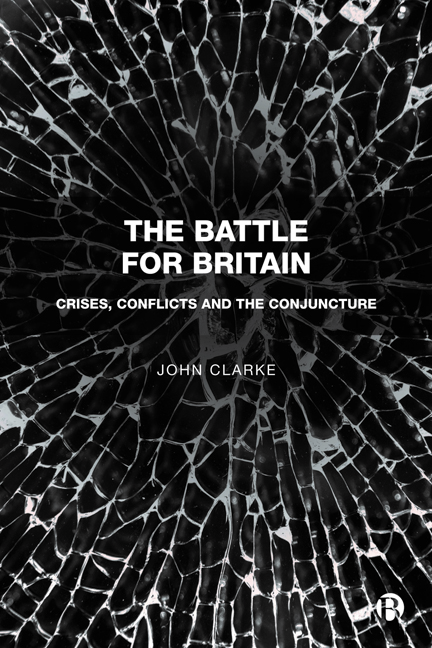Introduction: The Battle for Britain and Conjunctural Thinking
Published online by Cambridge University Press: 18 January 2024
Summary
‘And our mission is to deliver Brexit on the 31st of October for the purpose of uniting and re-energising our great United Kingdom and making this country the greatest place on earth … Our children and grandchildren will be living longer, happier, healthier, wealthier lives.’
Boris Johnson, 25 July 2019I started work on this book in 2018, driven by multiple frustrations. Since then, the UK has had four Prime Ministers, left the European Union (with some details still to be sorted out), experienced a sterling crisis, entered a period of unprecedented economic hardship, joined in a global pandemic and was – fleetingly – described as “the best country in the world to be a black person” (Kemi Badenoch, MP). There have been various stories told about this political and social turbulence and its alarming acceleration in mid-2022. Some centre on the fractious fortunes of the Conservative Party. Others have pointed to the dislocations of Brexit, following the referendum over whether to remain in the EU (2016). A different story identifies the global financial crisis of 2008 (and its after-effects, including austerity politics) as the point of entry. Meanwhile, other accounts have traced the origins of our present troubles to the liberalisation of global trade, inaugurated by the Reagan– Thatcher alliance in 1979– 1980 and often described as the beginning of ‘neoliberal globalisation’. In this book, I explore how all of these moments – and more – came together and were condensed in our current conflicts. Rather than focusing on one story, I suggest that it is vital to examine the ways in which these stories are entangled both with each other and with still longer histories to make these different moments possible.
I examine how these different moments are connected with, and contribute to, a wider ‘Battle for Britain’, one that is distinctively marked by the rise of political-cultural movements committed to British/English nationalism. I stress political-cultural since these conflicts extend well beyond what is conventionally understood as politics – into arguments about who ‘we’ are (the nation, the people), about ‘our history’ (and how to memorialise or protect it), about how Britain might be ‘Great’ again.
- Type
- Chapter
- Information
- The Battle for BritainCrises, Conflicts and the Conjuncture, pp. 1 - 12Publisher: Bristol University PressPrint publication year: 2023
- 1
- Cited by

